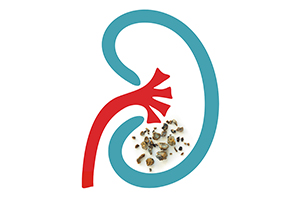Q: I had a kidney stone for the first time (52 year-old male), and I was researching why this happened at this stage of the game. I read how a gut bacteria called Oxalobacter formigenes metabolizes oxalates in the gut, reducing the incidence of kidney stones.
How can I colonize my gut with this helpful bacteria?
A: Approximately 75 percent of all kidney stones are calcium oxalate stones. Oxalate is a common component of many nutritious plant foods such as spinach, nuts, berries, oats, beans, chard, watercress, black tea and cocoa, to name a few. However, the propensity of these foods to raise urinary oxalate is dependent not just on oxalate content, but how efficiently it’s absorbed.
It’s true when they say good health begins in the gut because oxalate degradation requires an adequate amount of Oxalobacter formigenes. This beneficial bacteria helps reduce the amount of oxalate absorbed, decreasing the risk of kidney stone formation. While colonization of O. formigenes begins in infancy, only 60 to 80 percent of adults continue to carry the bacteria. According to researchers, this may be due to the use—and overuse—of antibiotics.
To date, studies reveal that O. formigenes, as well as other probiotic bacteria, could be protective in those predisposed to kidney stones. One study reported an average decrease of 40 percent in urinary oxalate excretion in six subjects with kidney stones after four weeks of taking probiotics, while a second study of eleven healthy individuals also following a low-oxalate diet showed a decrease of 33 percent in urinary oxalate. The probiotic formulations in these studies included the following species:
Lactobacillus acidophilus
Lactobacillus plantarum
Lactobacillus paracasei
Lactobacillus bulgaricus
Streptococcus thermophilus
Bifidobacterium infantis
Bifidobacterium longum
Notice these probiotics are commonly found in yogurt and kefir as well as probiotic formulations, so it’s fairly easy to reinoculate your gut to support O. formigenes growth.
There are other risk factors for kidney stone formation, including not drinking enough water. Generally, we need eight, eight-ounce cups a day. In fact, the highest incidence of kidney stones occurs in summer, and it’s usually secondary to dehydration. Taking calcium supplements (especially without magnesium) or eating a high calcium diet, as well as taking too much vitamin C, will also contribute to stone formation.
If you’re predisposed to kidney stones, taking a daily magnesium citrate supplement is recommended to help keep calcium from crystallizing and forming stones. Drinking water with lemon also introduces citrate in the form of citric acid, aiding in solubilizing stones.
To your health!
Source: Liebman M, Al-Wahsh I. Probiotics and other key determinants of dietary oxalate absorption. Amer Society for Nutr. 2011; 2: 254-260.
As you may know, I’ve been doing a weekly “Q&A with Leyla” podcast feature with Dr. Hoffman. Now you can get my perspective and expertise every Friday on my own episode of the Intelligent Medicine Podcast. If you missed last week’s, you can listen here. To be sure you don’t miss out on any of my important insights and information, subscribe today!








